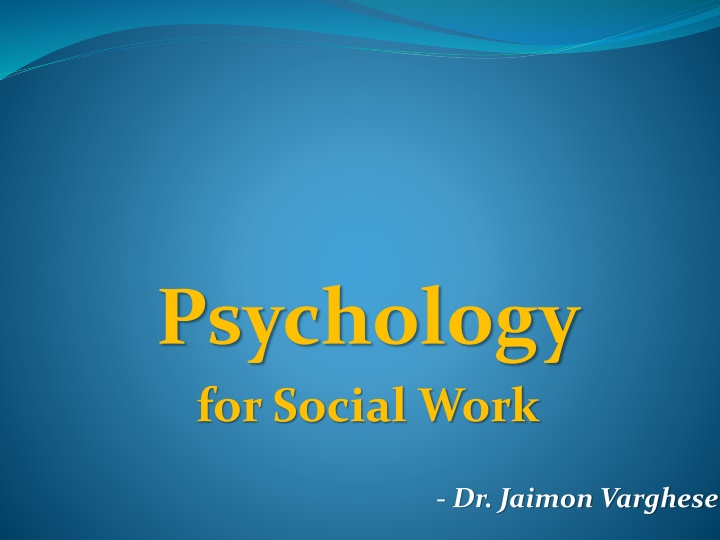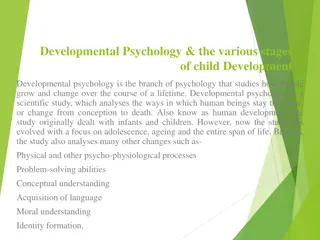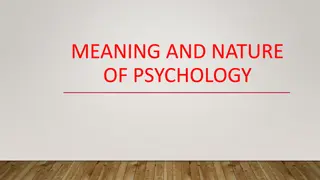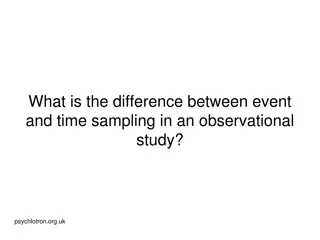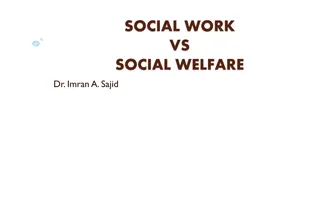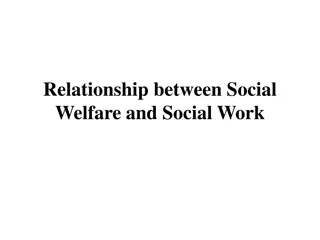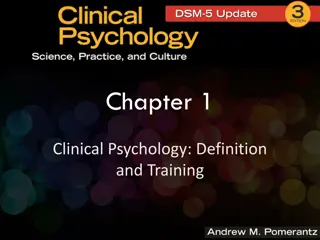Psychology for Social Work
In social work, understanding the concept of adjustment is crucial for dealing with conflicts, stress, and frustration. Learn how individuals use coping mechanisms and defense mechanisms to adapt to social environments effectively. Faulty socialization can lead to maladaptive behavior patterns. The integration of one's personality depends on successful adjustment to the environment. Explore the chief business of man in achieving effective integration and successful adjustment in social work.
Download Presentation

Please find below an Image/Link to download the presentation.
The content on the website is provided AS IS for your information and personal use only. It may not be sold, licensed, or shared on other websites without obtaining consent from the author.If you encounter any issues during the download, it is possible that the publisher has removed the file from their server.
You are allowed to download the files provided on this website for personal or commercial use, subject to the condition that they are used lawfully. All files are the property of their respective owners.
The content on the website is provided AS IS for your information and personal use only. It may not be sold, licensed, or shared on other websites without obtaining consent from the author.
E N D
Presentation Transcript
Psychology for Social Work - Dr. Jaimon Varghese
4. Processes of Adaptation & Adjustment 4.1. Concept of adjustment 4.2. Concept of Stress, frustration & Conflicts 4.3. Defense mechanisms 4.4. Coping mechanisms 21-02-2025 03:05:04 Psychology for Social Workers 2
4.1 Concept of Adjustment Life is a constant adjustment of personal goals (aspirations) with social goals (expectations) In this process of social adjustment, occurs conflicts, stress and frustration Individuals use coping mechanisms to deal with conflicts, stress and frustration; upon failure to cope with them satisfactorily, they use defense mechanisms 21-02-2025 03:05:04 Psychology for Social Workers 3
4.1 Concept of Adjustment By socialisation, individuals learn the techniques of adjusting himself to the demands of his social environment interpersonal, group and cultural. Faulty socialisation leads to maladaptive behaviour patterns such as sociopath (socially irresponsible behaviour), criminals, substance abuse, terrorists etc. 21-02-2025 03:05:04 Psychology for Social Workers 4
4.1 Concept of Adjustment The chief business of man is to secure and maintain a functionally effective integration of his personality, on the one hand, and to secure and maintain an adequate and successful adjustment of his personality or organism to his environment, on the other hand. The integration of his personality depends primarily upon the success of his adjustment to his environment, and also that the success of this adjustment is in no small degree dependent upon an effective integration of his personality. 21-02-2025 03:05:04 Psychology for Social Workers 5
The chief business of man is to secure and maintain a functionally effective integration of his personality, on the one hand, and to secure and maintain an adequate and successful adjustment of his personality or organism to his environment, on the other hand. 21-02-2025 03:05:04 Psychology for Social Workers 6
4.1 Concept of Adjustment The chief business of man is to secure and maintain a functionally effective integration of his personality, on the one hand, and to secure and maintain an adequate and successful adjustment of his personality or organism to his environment, on the other hand. The integration of his personality depends primarily upon the success of his adjustment to his environment, and also that the success of this adjustment is in no small degree dependent upon an effective integration of his personality. 21-02-2025 03:05:04 Psychology for Social Workers 7
4.1 Concept of Adjustment Human organism has few patterns at birth that can serve him directly in making effective adjustments to his social environment His reflexes and instincts are integrated only on an organic level, and are therefore adequate only to the organic needs of protection against dangerous physical impacts. Environments of man: natural and the cultural or social environments. 21-02-2025 03:05:04 Psychology for Social Workers 8
4.1 Concept of Adjustment The behaviour of organisms is constantly engaged in the process of adjusting to their environments (natural or cultural) under the guidance of social conditionings or controls. The natural environments are those as yet unmodified by man and to which man had originally to make an adjustment relatively unaided by cultural technique. 21-02-2025 03:05:04 Psychology for Social Workers 9
4.1 Concept of Adjustment The cultural environments are the products of man's adjustment to his environment originally derived from the transformation of parts of the natural environments This process of transforming nature into culture through the reconditioning of human responses and the building-up of behaviour and culture patterns is the process of invention. 21-02-2025 03:05:04 Psychology for Social Workers 10
4.1 Concept of Adjustment By means of cultural inventions man has created his tools and machines; domesticated plants and animals; trained man and beast to take part in a social economy; created language and communication; fostered tradition, literature, philosophy, and science; and has generated institutions to perpetuate culture and to control and condition the behaviour of man with reference to nature and his fellows. 21-02-2025 03:05:04 Psychology for Social Workers 11
4.1 Concept of Adjustment These same cultural creations of man, which arose originally out of nature itself through the spontaneous and necessary conditioning of responses in the incidence of the adjustment process, also constitute man's cultural environments, which now are more immediate and perhaps more voluminous than his natural environments and which therefore have much more weight in reconditioning his responses for social adjustment 21-02-2025 03:05:04 Psychology for Social Workers 12
4.1 Concept of Adjustment Factors of social adjustment include Knowledge and skill base (cognitive factors) Self and personality factors (psychological factors) Social support systems / safety nets (social factors) Economic and environmental factors 21-02-2025 03:05:04 Psychology for Social Workers 13
4.2.1. Stress Stress is a condition or feeling experienced when a person perceives that demands exceed the personal and social resources the individual is able to mobilize. Stress, a matter of judgment: firstly they must feel threatened by the situation, and secondly they must doubt that their capabilities and resources are sufficient to meet the threat. 21-02-2025 03:05:04 Psychology for Social Workers 14
4.2.1. Stress How stressed someone feels, depends on how much damage they think the situation can do them, and how closely their resources meet the demands of the situation. This sense of threat involves perceived threats to our social standing, to other people s opinions of us, to our career prospects or to our own deeply held values. 21-02-2025 03:05:04 Psychology for Social Workers 15
4.2.1. Stress Just as with real threats to our survival, these perceived threats trigger the hormonal fight-or-flight response, with all of its negative consequences. Stress reduces our performance as we divert mental effort into handling them. They can also cause a great deal of unhappiness and illness. 21-02-2025 03:05:04 Psychology for Social Workers 16
4.2.1. Causes of Stress Much of our stress are job related things Work overload, Conflicting priorities, Inconsistent values, Over-challenging deadlines, Conflict with co-workers, Unpleasant environments and Problem of commuting Inability / incompetence in performance 21-02-2025 03:05:04 Psychology for Social Workers 17
4.2.1. Causes of Stress Stressors in the lives of social workers Clients physical or verbal attacks on the worker, Suicide attempts, Suicidal statements, Threats, Clients resistance, Lack of motivation of the clients / partnergroup, 21-02-2025 03:05:04 Psychology for Social Workers 18
4.2.1. Causes of Stress Stressors in the lives of social workers Failure to show up for appointments, Blaming others and refusing to work on their own issues, Asking for special favours, Unnecessarily calling the social workers at home, Homosexual or heterosexual flirting on the part of the clients, Impositions (burden / nuisance) on social worker etc 21-02-2025 03:05:04 Psychology for Social Workers 19
4.2.1. Causes of Stress Types of stressors (according to DSM IV axis IV): Marital; financial; parenting; legal interpersonal phases of the life cycle occupational physical illness/injury Living circumstances: disasters, rape, persecution... These stressors are rated on a six point scale, ranging from "None" to "Catastrophic". 21-02-2025 03:05:04 Psychology for Social Workers 20
4.2.1. Causes of Stress Stressors of personal life are Illness or death in family, Marital problems, Financial loss, Personal illness, Developmental crisis, Other failures and frustrations 21-02-2025 03:05:04 Psychology for Social Workers 21
4.2.1. Theory of Stress Hans Selye identified the General Adaptation Syndrome The Alarm Phase, they perceive the stressor; The Resistance Phase, the resistance to the stressor increased and this phase lasts for as long as the animal could support this heightened resistance; Finally, the Exhaustion Phase, and resistance declined substantially. 21-02-2025 03:05:04 Psychology for Social Workers 22
4.2.1. Impact / effects of Stress Effect on job performance: Decrease in quantity & quality of work, Decline in motivation, Avoidance of job tasks, Increase in mistakes, Establishment of perfectionist standards, Avoidance of job task and Obsession with details 21-02-2025 03:05:04 Psychology for Social Workers 23
4.2.1. Impact / effects of Stress Effect on interpersonal relationships: Withdrawal from colleagues, Impatience, Decrease in quality of relationships, Poor communication, subsume by own needs and Staff conflicts 21-02-2025 03:05:04 Psychology for Social Workers 24
4.2.1. Impact / effects of Stress Effect on morale: Decreased confidence, Loss of interest, General dissatisfaction, Negative attitude, Apathy, Demoralisation & Feelings of incompleteness, Lack of appreciation, Detachment & Reduced self esteem 21-02-2025 03:05:04 Psychology for Social Workers 25
4.2.1. Impact / effects of Stress Effect on behavioural functioning: Absenteeism, Exhaustion, Faulty judgment, Irritability, Frequent tardiness (delay), Irresponsibility, Overworked, Frequent job changes, Substance abuse 21-02-2025 03:05:04 Psychology for Social Workers 26
4.2.1. Impact / effects of Stress When under pressure, some people are more likely to drink heavily or smoke, as a way of getting immediate relief from stress. Others may have so much work to do that they do not exercise or eat properly. They do not take time to see the doctor or dentist when they need to. 21-02-2025 03:05:04 Psychology for Social Workers 27
4.2.1. Impact / effects of Stress The link between stress and heart disease is well-established. If stress hormones are not used up by physical activity (exercise , yoga etc.), our raised heart rate and high blood pressure put tension on arteries and cause damage to them. Stress hormones accelerate the heart to increase the blood supply to muscles; if not enough blood reaches the heart to meet these demands, it causes a heart attack. 21-02-2025 03:05:04 Psychology for Social Workers 28
4.2.1. Impact / effects of Stress Stress damages the immune system. We catch more colds when we are stressed. It also seems to affect headaches and irritable bowel syndrome. Stress is also associated with mental health problems and, in particular, anxiety and depression. 21-02-2025 03:05:04 Psychology for Social Workers 29
4.2.1. Impact / effects of Stress As we become uncomfortably stressed, distractions, difficulties, anxieties and negative thinking begin to crowd our minds. These thoughts compete with performance of the task for our attention capacity. Concentration suffers, and focus narrows as our brain becomes overloaded. The more our performance suffers, the more new distractions, difficulties, anxieties and negative thoughts crowd our minds. 21-02-2025 03:05:04 Psychology for Social Workers 30
4.2.1. Impact / effects of Stress Other research has shown that stress reduces people s ability to deal with large amounts of information. Both decision- making and creativity are impaired. Exposure to cumulative stress, crisis & traumatic events in our professional or personal lives cause physical and mental exhaustion that leads to professional burnout. 21-02-2025 03:05:04 Psychology for Social Workers 31
4.2.1. Impact / effects of Stress Compassion fatigue or secondary traumatic stress which can lead to burnout is the natural consequent behaviour and emotions resulting from knowing about a traumatising event experienced by a significant other. Built on feelings of sympathy and empathy, compassion expresses an unselfish concern for the welfare of others . Having repeatedly exposed to the suffering of their clients, the social workers find themselves increasingly unable to rebound or offer the quality of service they know would be best. 21-02-2025 03:05:04 Psychology for Social Workers 32
4.2.1. Impact / effects of Stress Failing to take good care of themselves, dealing with lingering distress from troubling events in their own lives, inability or refusal to control stress at work and the lack of satisfaction in work all deplete the social worker s ability to do his or her best. Stress response builds up tension that is not released. The energy utilised is not restored and can ultimately lead to exhaustion & burnout. Over a period of time, prolonged exposure to the stress and the resulting exhaustion can cause significant problems to one s physical and psychological well being. 21-02-2025 03:05:04 Psychology for Social Workers 33
4.2.1. Stress Management Strategies for coping with fatigue and burnout include Relaxation therapy, Yoga and meditation, Physical exercises, Entertainment and sports, 21-02-2025 03:05:04 Psychology for Social Workers 34
4.2.1. Stress Management Taking break, Going for holidays and sight seeing, Positive thinking, Finding new friends and Spending time for social networking and Finally taking risks and Changing jobs 21-02-2025 03:05:04 Psychology for Social Workers 35
4.2.1. Stress Management Lack of information can often be stressful, particularly at a time when people may be insecure about their jobs. Often, the best thing to do in these cases is to ask for clarification of the situation. Take a look at our environmental stressors and improve your working conditions. Make the workplace more enjoyable or pleasant and improve people's quality of life. 21-02-2025 03:05:04 Psychology for Social Workers 36
4.2.1. Stress Management If you are exposed to frequent upset and interruption, practice relaxation techniques Taking frequent effective exercise is one of the best physical stress-reduction techniques available. Exercise not only improves your health and reduces stress caused by unfitness; it also relaxes tense muscles and helps you to sleep well. Apply rational and positive thinking skills to quiet the negative thinking. Identify and challenge the goals, beliefs and interpretations of events that may be a source of intense stress. 21-02-2025 03:05:04 Psychology for Social Workers 37
4.2.1. Stress Management Building and using your social networks and of taking sufficient breaks Employers have no obligation to make jobs pleasant or rewarding. Some jobs are intrinsically unpleasant. If you do not like your current job, then the best thing may be to find a job that brings you the pleasure and the rewards you need. 21-02-2025 03:05:04 Psychology for Social Workers 38
4.2.1. Stress Management Since burnout is an outcome of continuous exposure to stressful situations all the efforts to prevent the stressors will also remove the possibility of burnout Action-oriented: In which we seek to confront the problem causing the stress, changing the environment or the situation; 21-02-2025 03:05:04 Psychology for Social Workers 39
4.2.1. Stress Management Emotionally-oriented: In which we do not have the power to change the situation, but we can manage stress by changing our interpretation of the situation and the way we feel about it; and Acceptance-oriented: Where something has happened over which we have no power and no emotional control, and where our focus is on surviving or coping with the stress. 21-02-2025 03:05:04 Psychology for Social Workers 40
4.2.2 Frustration Internal frustration may arise from Perceived deficiencies Lack of confidence or Fear of social situations, Conflict Competing goals & Cognitive dissonance 21-02-2025 03:05:04 Psychology for Social Workers 41
4.2.2 Frustration External causes of frustration: Blocked road or a Difficult task Pathological frustration: Feel powerless to change the situation they are in 21-02-2025 03:05:04 Psychology for Social Workers 42
4.2.2 Frustration Common effects of frustration is Aggression (violence) or Regression Becoming childish or Throwing a temper tantrum, Bursting into tears, Sulking or wearing a long face and a worried look 21-02-2025 03:05:04 Psychology for Social Workers 43
4.2.2 Frustration Ways to deal with frustration: Ask what would work now; Focus on what you want to happen; Remove the noise and simplify; Stay positive; Keep an accomplishments log 21-02-2025 03:05:04 Psychology for Social Workers 44
4.2.3. Conflicts A state of disharmony between incompatible or antithetical persons, ideas, or interests; a clash A psychic struggle, often unconscious, resulting from the opposition or simultaneous functioning of mutually exclusive impulses, desires, or tendencies Conflicts of goals Approach-approach Approach-avoid Avoid-avoid 21-02-2025 03:05:04 Psychology for Social Workers 45
4.2.3. Conflicts Interpersonal barriers: value conflicts, attitude conflicts, beliefs & goals differences Conflicting cognitions: cognitive dissonance Inter group and intra group conflicts 21-02-2025 03:05:04 Psychology for Social Workers 46
4.2.3. Conflicts Resolve conflicts: Treat each person in a caring and respectful fashion, Mindful of individual differences and cultural and ethnic diversity; Socially responsible self-determination; Clients capacity and opportunity to change; 21-02-2025 03:05:04 Psychology for Social Workers 47
4.2.3. Conflicts Resolve conflicts between clients interests and the broader society s interests (dual responsibility) in a socially responsible manner consistent with the values of the profession. 21-02-2025 03:05:04 Psychology for Social Workers 48
4.3. Defense mechanisms A physiological reaction of an organism used in self-protection, as against infection. Any of various usually unconscious mental processes, including denial, projection, rationalization, and repression, that protect the ego from shame, anxiety, conflict, loss of self- esteem, or other unacceptable feelings or thoughts. Defense mechanism, in psychoanalysis, is any of a variety of unconscious personality reactions which the ego uses to protect the conscious mind from threatening feelings and perceptions. 21-02-2025 03:05:04 Psychology for Social Workers 49
4.3. Defense mechanisms In psychoanalytic theory, a defense mechanism is an unconscious way to protect one's personality from unpleasant thoughts which may otherwise cause anxiety. This can work well in small doses. However, a defense mechanism can also lead to a neurosis if it causes a person to adopt ineffectual or inappropriate coping strategies. Ego defences are due to inadequate social development and faulty socialisation 21-02-2025 03:05:04 Psychology for Social Workers 50
